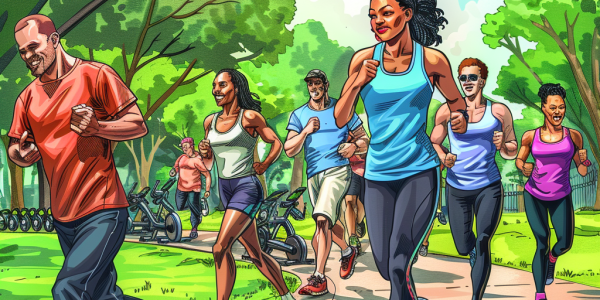Stair Climbing: A Simple Path to Longevity
Discover the surprising benefits of stair climbing for longevity. Recent research shows that simple activities like climbing stairs can significantly enhance your life expectancy. Regular exercise, especially for those over 40, can add years to your life. Learn how incorporating stair climbing into your daily routine can improve health, reduce chronic disease risk, and promote mental well-being. Start prioritizing your health today with this easy lifestyle change!
WHO Warns: Adolescents Exceed Sedentary Time Recommendations Amid Social Media Surge
A recent WHO study reveals that adolescents are spending 8 to 10 hours daily in sedentary activities, far exceeding the recommended limit of 2 to 3 hours. The research highlights a concerning link between social media usage and increased sedentary behavior, emphasizing the need for interventions to promote physical activity and address health risks associated with excessive screen time. This comprehensive study, involving researchers from 14 countries, calls for a collaborative approach among parents, educators, and policymakers to foster healthier lifestyles for youth.
The Health Benefits of Walking Breaks at Work
Incorporating short walking breaks during the workday can significantly enhance cardiovascular health and manage blood sugar levels, according to recent research. A study published in *Medicine & Science in Sports & Exercise* found that walking for just five minutes every 30 minutes can lead to remarkable health benefits for office workers. This article explores the importance of integrating walking into daily routines to combat the negative effects of a sedentary lifestyle.
Weekend Warriors: Study Reveals Health Benefits of Occasional Exercise
A recent study reveals that ‘weekend warriors’—those who exercise once or twice a week—can enjoy cognitive health benefits similar to regular exercisers. This research highlights the importance of physical activity in reducing dementia risk and improving mental well-being, suggesting that even short bursts of exercise can significantly enhance overall health.
Exercise May Alleviate Hangover Symptoms, Study Suggests
Recent research published in Addictive Behaviours reveals that regular exercise may significantly alleviate hangover symptoms. A study involving 1,676 students found a correlation between physical activity and reduced hangover severity, suggesting that engaging in vigorous exercise can help mitigate headaches, nausea, and fatigue after a night of drinking. Incorporating regular workouts not only promotes overall health but may also serve as a valuable strategy for lessening the impact of hangovers.
Study Reveals Weekend Warriors Enjoy Same Health Benefits as Daily Exercisers
A recent study reveals that ‘weekend warriors’ can achieve the same health benefits as daily exercisers by meeting the recommended 150 minutes of physical activity per week. This groundbreaking finding empowers those struggling with consistent workout routines, highlighting that the volume of exercise matters more than the frequency. Discover how to prioritize your health with effective fitness gear and personalized workout strategies.
New Study Reveals Breaks During Walking Boost Calorie Burn Efficiency
Recent research reveals that taking breaks during walks may enhance calorie burn compared to a steady pace. A study from the University of Milan found that short bursts of walking require 20% to 60% more oxygen, suggesting that incorporating rest periods could optimize energy expenditure. This insight challenges traditional walking advice and offers a more efficient approach to fitness, making exercise more accessible for various populations.
Exercise Proven Effective in Treating Major Depression, Study Finds
Recent research highlights the vital role of exercise in treating major depression, showing that physical activity can be as effective as antidepressants and therapy. With over 14,000 participants, the study emphasizes exercise as a low-cost, accessible intervention, urging mental health professionals to integrate it into treatment plans for improved mental well-being.
Rethinking the 10,000 Steps a Day Trend: Personalizing Fitness Goals for Better Health
Explore the origins and implications of the 10,000 steps a day trend, originally popularized by Dr. Yoshiro Hatano in Japan. Discover how recent studies reveal the benefits of regular walking for mental health, the importance of personalizing fitness goals, and alternative activities to enhance overall wellbeing. Learn why a consistent routine may be more effective than merely counting steps.
Moderate Exercise Found to Combat Workplace Burnout
A recent study published in the Journal of Occupational and Environmental Medicine reveals that moderate physical activity can significantly reduce workplace burnout and enhance job satisfaction. Engaging in regular exercise, such as strength training or hiking, helps combat emotional exhaustion and promotes mental well-being among employees. Discover how incorporating moderate exercise into daily routines can lead to a healthier work-life balance and a more productive workforce.










